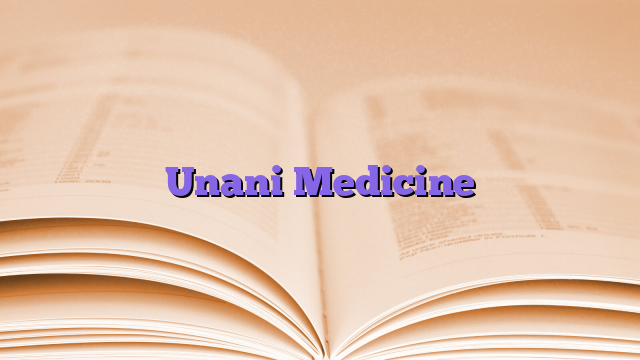
meaning and origin
Unani means medicine, which is a symbol of life. The name derives from the Greek word “Ionian”. “Tibb” means the knowledge of the states of the human body in health and declining health, or in other words, medicine. ‘Tibb-E-Unani’ is therefore an ancient, proven system of medicine, dating back 5000 years to Greece.
Unani medicine, like any other form of medical science, strives to find the best possible ways by which a person can lead a healthy life with few or no illnesses. It prescribes medications, diets, beverages, and other regulations, including codes of conduct, conducive to maintaining and promoting positive health and preventing and curing disease. The ultimate goal of these scientific regulations and prohibitions is the creation of a healthy society.
Traditional systems of medicine are undoubtedly widespread in different countries of the world. But most of these are empirical. On the other hand, Unani and their allied branches have rational and scientific principles. It differs from other branches of medicine as the drugs used are natural in their sources and forms. She emphasizes the preservation of natural compounds that belong to the human body and therefore only prescribes natural remedies. Unani Medicine believes that disease can be kept at bay by using clean and fresh water, breathing clean air, and eating fresh food. Likewise, a balance should be maintained between the mind and body so that the metabolic process can run smoothly and the body wastes can be discharged. Unani Medicine also believes that all life forms originated from the sea.
branches
There are eight specialized branches of Unani medicine –
• Internal Medicine (Moalijat)
• Gynecology including obstetrics and paediatrics
• Disorders of the head and neck
• Toxicology
• Psychiatry
• Rejuvenation therapy including geriatrics
• Sexology
• Regimental therapy
• Diet therapy
• Hydrotherapy
description
According to today’s Unani discipline, the human body consists of 7 natural and fundamental components called “Umoor e Tabaiyah” which are responsible for maintaining health.
These are: –
• Arcane (Elements)
• Mizaj (temperament)
• Akhlaat (Humor)
• Aaza (organs)
• Arwah (vital forces or neuro)
• Quwa (Faculties)
• Afaal (Functions)
Losing any of these basic components or altering their physical condition can lead to illness or even death. It is extremely important to consider all of these factors in order to come to the right diagnosis and consequently the right line of treatment.
The Unani Doctors describe that hidden within each individual is a special ability called the body’s defense mechanism or in the language of the Unani – “Tabiyat-e-Muddabare Badan”. The ‘Tabiyat’ can be defined as the totality of man’s structural function and psychological character. The ‘Tabiyat’ or Nature is the best physician and maintains the balance of the four humors or ‘akhlat’.
Their quantity and quality should correspond to the natural chemical composition of the body.
The UNANI system of holistic health views illness as an event designed to cleanse, purify and balance us on the physical, emotional, mental and spiritual levels.
Allah (the one God of all) says in the Qur’an: “There may be something destined for you that you do not like that is good for you; and things you like that are not good for you.” Imam al-Ghazzali (ra) expressed this idea as follows: “Disease is one of the forms of experience through which people come to the realization of God; as he says: ‘Diseases are my servants whom I bind to my chosen friends.’ “Just because something feels ‘good’ doesn’t mean it will ultimately benefit us. And conversely, when we have a moment of pain, we cannot dismiss that experience as “bad” without understanding how and what the outcome of those sensations will be. A “healing crisis” is the body’s natural function of eliminating toxins: vomiting, nosebleeds, diarrhea, fever, sweating, and frequent urination are pathways to full health.
While the UNANI Tibb system admits the existence of microbes, it claims that it is the primordial imbalance of temperament that provides an altered biotic environment in which viruses and bacteria can thrive. Treatments to kill microbes can offer a temporary “cure,” but without restoring the humors to their proper balance, the disease will return. So, the UNANI-Tibb system seeks a balance between the body’s juices and temperament, mainly through the proper metabolism of body food.
Obstacles in Unani Medicine
Despite being a complete treatment system, like other medical systems, the Unani system has drawbacks in terms of use and effectiveness. The vast materia medica, from plant and animal to mineral sources, as described in ancient Unani textbooks is sometimes so vague that authenticity must be established by modern pharmacognostic assessments (using a basic, descriptive pharmacology) before Medicines can be used. In addition, the use of gemstones and minerals, the main components of many poly-formulations (multi-ingredient medicinal products), in Unani medicine is expensive. These items are also often unavailable, hindering effective treatment.
Thanks to Awnish Todi
